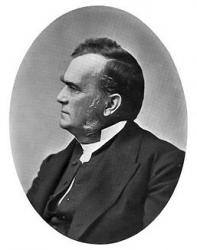1775 - 1852 Author of "Hark! what mean those holy voices" in The Evangelical Hymnal with Tunes John Cawood was born in 1775, at Matlock, Derbyshire, where his father carried on a small farm. He enjoyed very limited educational advantages. At the age of eighteen he occupied a menial position. But seeking every opportunity of self improvement, and aided by those who interested themselves in his behalf, he was enabled in 1797 to enter S. Edmund Hall, Oxford, and obtained his B.A. in 1801, and his M.A. in 1807. He was ordained in 1801, and most of his life in the ministry was spent as perpetual Curate of S. Ann's Chapel of Ease, Bewdley, Worcestershire. He died in 1852. He published several prose works, but no volume of hymns or poems. His son says, "My father composed about thirteen hymns, which have one by one got into print, though never published by himself, or any one representing him."
--Annotations of the Hymnal, Charles Hutchins, M.A., 1872
=======================
Cawood, John, M. A., born at Matlock, Derbyshire, March 18, 1775. His parents being in humble circumstances, he received in childhood but a limited education, and at 18 was engaged in the service of the Rev. Mr. Cursham, Sutton-in-Ashfield, Notts. Three years' study, however, under careful direction, enabled him to enter St. Edmund Hall, Oxford, in 1797. Obtaining his degree in 1801, he took Holy Orders, and became successively Curate of Ribsford and Dowles, and Incumbent of St. Ann's Chapel of Ease, Bewdley, Worcestershire. He died Nov. 7, 1852. His hymns, 17 in all, were never published by himself. Of these 9 were included in Cotterill's Selection, 8th ed., 1819, Nos. 268-276. Most of these have passed into other collections. These are :—
1. Almighty God, Thy word is cast. After a Sermon.
2. Hark! what mean those holy voices? (1819.) Christmas.
3. Begin a joyful song. (1819.) Christmas.
4. Behold yon wondrous star. (1819.) Epiphany.
5. Trembling with tenderest alarms. (1816.) Finding of Moses.
6. In Israel's fane, by silent night. (1816.) Samuel.
7. King o'er all worlds the Saviour shone. (1819.) Good Friday.
8. Christians, the glorious hope ye know. (1819.1 Plea for Missions.
9. Hark! what mean those lamentations. (1819.) Missions.
In addition, Dr. Rogers pub. in his Lyra Britannica, 1867, from the author's manuscript:—
10. A child of sin and wrath I'm born. (1820.) Infant's Prayer.
11. The Sou of God, in worlds on high. (1822.) Christ's Humility.
12. Blessed Father, Great Creator. (1837.) Holy Trinity.
These details are from the S. MSS., amongst which there are 5 hymns yet unpublished.
--John Julian, Dictionary of Hymnology (1907)
John Cawood






